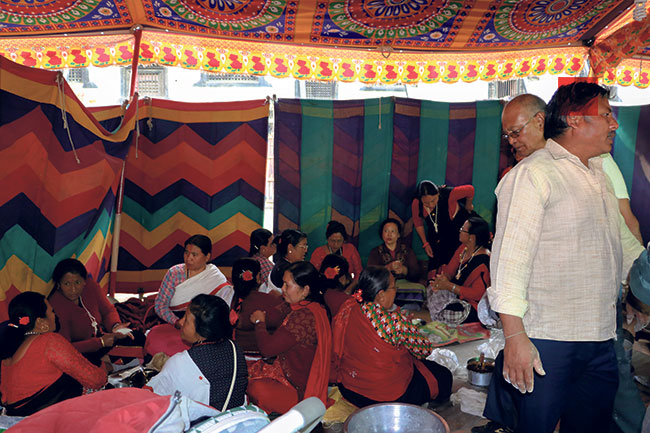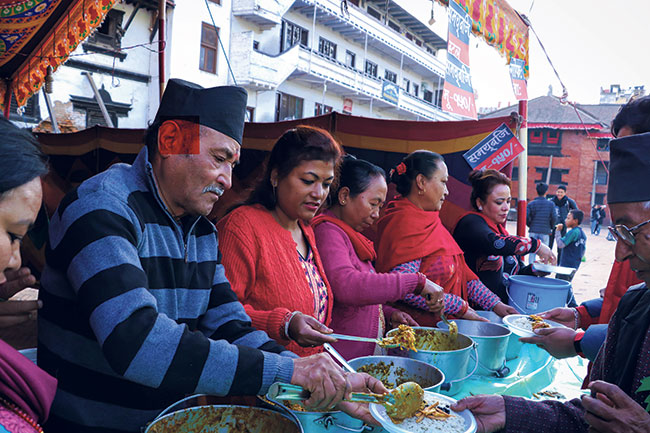Kathmandu is a city that’s as developed as it gets from a typical Nepali’s perspective. There are people working at every street, running after money while responsibilities are continuously piling up on them as the days go by. And there are outliers, women, preferably married, in some parts of the valley. Homemakers in many rural parts of Kathmandu do not prefer to go mainstream with their skills.
 Homemakers with similar life stances have tried to make good use of their skills by collectively aiming to do something productive with the rest of the neighborhood, and earn a bit of money as well if that follows. They assemble to form organizations, essentially ‘mahila samuha’ (women’s group) and are learning different productive works from each other, both to earn money and make some use of their time.
Homemakers with similar life stances have tried to make good use of their skills by collectively aiming to do something productive with the rest of the neighborhood, and earn a bit of money as well if that follows. They assemble to form organizations, essentially ‘mahila samuha’ (women’s group) and are learning different productive works from each other, both to earn money and make some use of their time.
A food fest was organized by similar group of women on Saturday at Basantapur, Kathmandu, which featured different sets of Newari food. There were a total of seven different groups of Newari women, all who had learned something productive. The event was organized by Kathmandu Mahanagar Samiti in collaboration with the Hanuman Dhoka Durbar Samiti.
From Switzerland to Nepal on foot: A man’s journey for a cause

 Nanihira Maharjan, vice president of the event, explained the event was organized mainly to promote Newari culture and also aware women, mainly homemakers, that they can be independent if they sharpen their skills. “We organize similar events every year, by this time we’ve focused on traditional Newari food. Groups of homemakers bring their food at the event and put it on display as well as for sale. This helps the homemakers showcase their skills while also promoting Newari food culture. They also learn entrepreneurship skills through such events.”
Nanihira Maharjan, vice president of the event, explained the event was organized mainly to promote Newari culture and also aware women, mainly homemakers, that they can be independent if they sharpen their skills. “We organize similar events every year, by this time we’ve focused on traditional Newari food. Groups of homemakers bring their food at the event and put it on display as well as for sale. This helps the homemakers showcase their skills while also promoting Newari food culture. They also learn entrepreneurship skills through such events.”
Dhan Bahadur Maharjan, one of the Guthi members linked to the Tyanga Twa women’s group, praised the women’s effort at the festival and said, “The homemakers have done a tremendous job by making traditional Newari dishes in this cold weather. Yomari is a classic Newari dish and a cold reliever. It’s a perfect thing to eat during winter.”
He further explained, “Tyanga Twa women’s group has come a long way. With about 40 active members and several other branches of aware women, the group has been focusing on creative works every day.”
Another women’s group, Om Bahal Twa Khala, at the festival had focused mainly on pickles. Rita Maharjan, one of the members of the group, explained that it was a second push at making pickles after their first attempt didn’t work well. “We tried giving pickle-making training in initial phase, but people didn’t take it seriously. So, we members stepped up as examples and went on to do it. It’s been good so far.”
She added, “The success after our first failure made us realize that forming an organization is only the first step. Sustaining the business requires real skills. But we are ready for all kinds of challenges now.”
Groups of homemakers coming together to showcase their skills can be a gateway to meeting new people and learning new things. Women’s organizations have also helped in the personal as well as skills development of such homemakers.






































